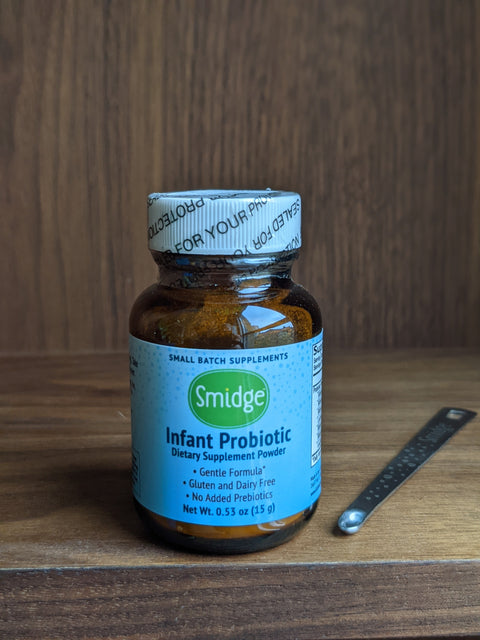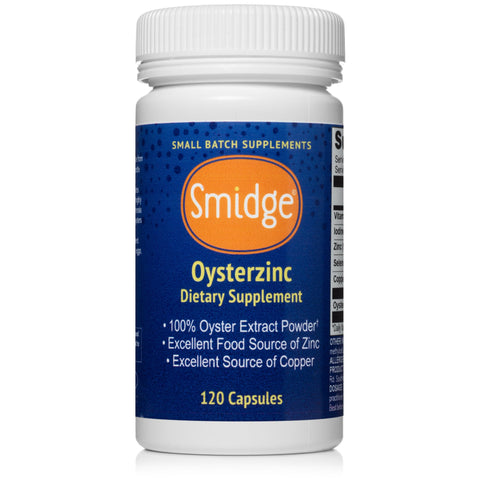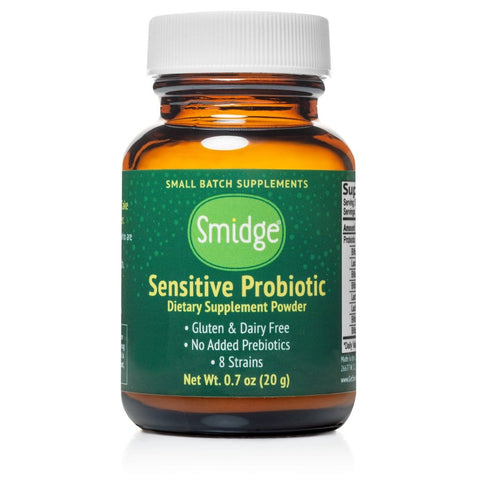How many strains does this formula have?
Our Infant Probiotic contains 7 clinically-proven human probiotic strains (B. infantis, B. bifidum, B. breve, B. longum, B. lactis, L. gasseri and L. salivarius (check out our ingredients section for more on the benefits of these probiotics for babies).
We use only the highest-quality probiotic bacteria: All strains have been thoroughly researched, documented and banked in recognized microbial culture collections. And all strains are non-GMO and American Type Culture Collection certified.
What strains were omitted from your Infant Probiotic, to avoid negative reactions?
We want nothing but gentleness for your baby. Smidge® Infant Probiotic does not contain certain strains found in other probiotics that can cause histamine intolerance, d-lactic acidosis or other adverse reactions. This means no strains that produce d-lactate, no streptococcus thermophilus, no spore-forming strains; and only histamine-neutral and histamine degrading strains. It also does not contain prebiotics.
Why is L. plantarum omitted?
No plants here. L. plantarum, a plant-based strain, is omitted in Smidge® Infant Probiotic because L. plantarum is a very potent strain that increases the potency of a probiotic formula. Because we wanted the infant formula to be less potent than the original Sensitive Probiotic powder, we did not include it. Customers with worries about d-lactate production may also prefer the omission of L. plantarum as it produces a small amount of d-lactate. However, it's important to remember that it helps balance the production of L-lactate.
Does Smidge® Infant Probiotic contain prebiotics?
Nope. There are no prebiotics in Smidge® Infant Probiotic. This is because prebiotics like inulin and maltodextrin are often included in other commercial brands as fillers, yet can feed pathogens and cause negative reactions in people with sensitive digestive systems. Breast milk already has its own unique prebiotics. And prebiotics have been added to infant formulas with beneficial effects. But bottom line, we want parents to be able to carefully develop their children's diets according to their unique situations.
Is the Infant Probtiotic free of all additives?
Yes! Smidge® Infant Probiotic does not contain common additives, allergens or fillers. This means no excipients or other added ingredients, such as magnesium stearate, silica, titanium dioxide.
Is the Infant Probiotic free of common allergens?
Absolutely. Smidge® Infant Probiotic is free of common allergens. All strains are grown on a dairy-free, soy-free, vegetarian, non-GMO culture. It does not contain milk/casein, eggs, fish, shellfish, wheat/gluten, peanuts, tree nuts, yeast, corn or soy.
Is the Infant Probiotic freeze-dried or live?
Brrrr. Smidge® Infant Probiotic is comprised of freeze-dried bacteria. Old school probiotics contained live cultures that died in transit due to warm temperatures. Freeze-dried bacteria can withstand warmer temperatures during transit.
What kind of diet works best when taking Smidge® Infant Probiotic?
Our Infant Probiotic powder works best with a wholesome, real food diet for mom and baby. Think healthy fats, organic or raw milk, wild-caught fish, grass-fed meat, organic vegetables; and the elimination of GMOs, additives, preservatives, chemicals and processed sugar/flour.
Tell me more about the studies on B. Infantis.
B. Infantis is amazing! As we touched on in the ingredients section, Bifidobacterium infantis is prevalent in the GI tracts of breastfed babies, as it feeds on unique oligosaccharides found in breast milk that infants can't digest — leaving little room for unwanted bacteria and supporting a healthy digestive ecosystem.*
In a scientific study, moms and infants received a B. infantis preparation and lactation support from a week to three weeks after birth. The bacteria quickly established themselves in the babies, crowding out other gut bacteria that are associated with intestinal problems and immune-related conditions such as asthma, allergies and autoimmune disease.* Meanwhile, another study discovered that nearly all babies born in developed nations (including the U.S.) no longer have B. infantis. It was hypothesized that an increase in cesarean sections, infant formula and antibiotics led to the reduction in this beneficial bacteria. This study stated that a stressed microbiome composition may lead to chronic inflammation and immune-mediated diseases, highlighting an increase in infant intestinal dysbiosis. The good news, according to research noted in the same study, is that remodeling of the gut microbiome in breastfed infants fed B. infantis improved gut function and ecosystem productivity.*
>B. Infantis (as well as several other strains in the Lactobacillus and Bifidobacterium families) also produces folate, which is necessary for infant development and growth and red blood cell creation.*
Where are the ingredients in Smidge® Infant Probiotic sourced and where is the supplement made?
The strains in our baby probiotics are sourced and produced in the U.S. :)
Can you ship Smidge® Infant Probiotic powder in hot temperatures?
Yes! Smidge® Infant Probiotic (and all of our probiotics!) can be shipped when it's hot outside. Smidge® probiotics are freeze-dried, so they hold up well to warm temperatures.
If a baby is breastfed do they not need this product?
We know fed is best! Regardless of whether your baby is breastfeeding or takes her nourishment from the bottle, a premium infant probiotic can help colonize little intestines with beneficial bacteria from the get-go, as well as offer digestive comfort, regularity and immunity.
Smidge® Infant Probiotic consists of 50% Bifidobacterium infantis, which dominates in breastfed babies' intestines. This is also beneficial for nursing mom to baby, because the amount of healthy bacteria baby receives is dependent on mom's diet and microbiome. And let's face it, new moms do all the things, so sometimes getting all four food groups in can be a feat, and therefore we need probiotic supplementation (Plus, balanced gut bacteria make it possible for babies to digest breast milk effectively, and to gain the milk's full nutritional benefits.*)
See, newborns are exposed to their mother's bacteria when making their way down the birth canal. This kicks off the production of good and sometimes pathogenic bacteria in the baby's GI tract.
All of this means the right blend of beneficial bacteria — in the form of probiotic-rich foods and the clean supplements — is the life force inside you and your little one. And gut flora is responsible for how your kiddies respond to most everything, from their pitter-patter of little feet to their grown-up steps, on their health journeys.





Comments (0)
There are no comments for this article. Be the first one to leave a message!